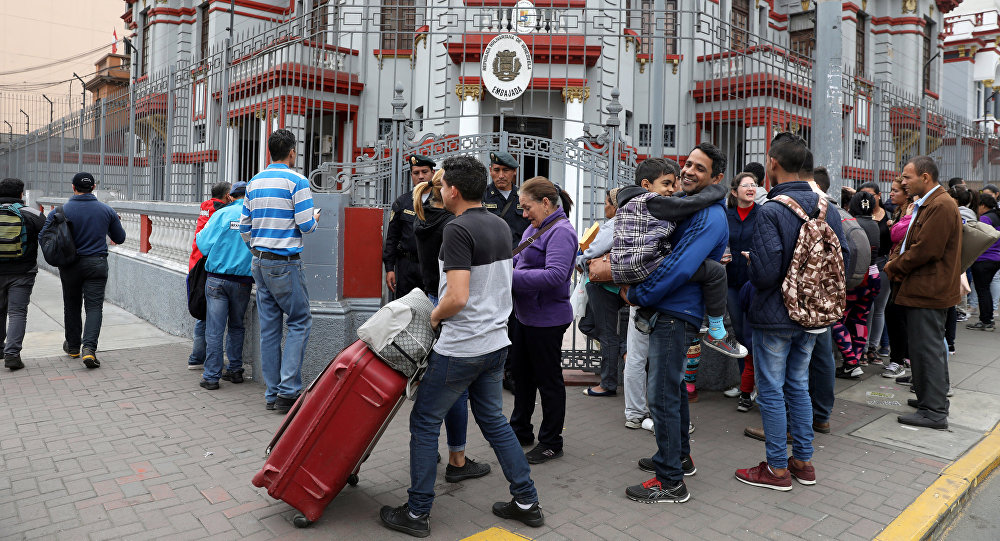Venezuela to Coordinate Repatriation of Emigrants with UN
By Ricardo Vaz for Venezuelanalysis
Venezuelan Executive Vice-President Delcy Rodriguez met with United Nations officials Wednesday to ask for the organization’s support in establishing air corridors for the return of Venezuelan emigrants.
“Don’t despair, you can be sure that these air corridors will work and soon you will be back in your homeland hugging your relatives,” Rodríguez announced to Venezuelan migrants after her meeting with representatives from several UN Agencies in Caracas.
The meeting, which also addressed cooperation in areas such as education, healthcare and environmental policies, was used by the Venezuelan government to request support from the UN’s migration office to set up air corridors with countries from where Venezuelan emigrants might wish to return.
President Maduro recently announced the “Return to the Homeland” plan, to support Venezuelans who have moved abroad and wish to return home, adding that recent measures will pave the way for stabilization and recovery of the Venezuelan economy.
“Today we are in an advantageous position in the face of destabilizing factors. We are making progress in stabilizing currency exchange rates, in the definitive recovery of salary and pensions, and on equitable, agreed-upon prices,” Maduro added.
August 27 saw a first plane return 89 Venezuelan citizens from Peru. This was followed by a gathering of hundreds of Venezuelans in front of the embassy in Lima, also demanding to be returned to their country. Returning Venezuelans complained of meeting discrimination and harsh living conditions upon arriving in Peru.
In addition, 185 Venezuelans have returned from the Brazilian border state of Roraima, and on Tuesday Jorge Rodriguez, minister for communications and information, announced that flights returning Venezuelan citizens from Argentina, Peru and Ecuador would arrive in the coming days.
Regional tensions over Venezuelan migration
Venezuelan migration has dominated the news cycle in recent times, with reports of xenophobic attacks as well as tensions between Venezuela and neighboring countries. A recent episode saw a federal judge in the state of Roraima order the closure of the border with Venezuela, only for the ruling to be subsequently overturned.
A summit dedicated to Venezuelan migration was held in the Ecuadorian capital of Quito on Monday and Tuesday. The meeting was attended by representatives of 14 countries, and produced a final declaration which was signed by all except the representatives from Bolivia and the Dominican Republic.
This declaration recognized the efforts of regional countries in receiving Venezuelan migrants, and called for an increase in funding and international cooperation for this purpose. The signatories also expressed their “grave concern for the grave deterioration of the internal situation [of Venezuela]” and called for the opening of a “humanitarian assistance mechanism to address this critical situation.”
In response, the Venezuelan government promptly vowed to submit a formal note of protest, claiming that the summit and declaration are divorced from reality and will lead to an increase in xenophobia. The Venezuelan government has also denounced that a media campaign surrounding the issue of migration is being used to justify a foreign intervention in the South American country.
According to UN figures, there are 2.3 million Venezuelans currently living abroad (roughly 7.5% of the population), with 1.6 million (5.2%) having left since 2015. A recent study by the UN’s Migration Office of the Venezuelan-Colombian border has also revealed that 67% of those crossing the border are Colombian nationals, and that 92% wish to return to Venezuela within months.
In recent weeks, both Ecuador and Peru have implemented a series of restrictions on Venezuelan migration, including establishing a passport requirement for entry which bars Venezuelans only in possession of a national identification card.
On Monday, Peru’s National Human Rights Commission presented a writ of habeas corpus against the country’s interior minister, Marco Medina, as well as Migration Superintendent Eduardo Sevilla, “for impeding the entry into national territory of Venezuelans who do not possess a passport.”
The body accused the Peruvian government of violating Venezuelans’ rights to free movement, refuge, and non-discrimination.

